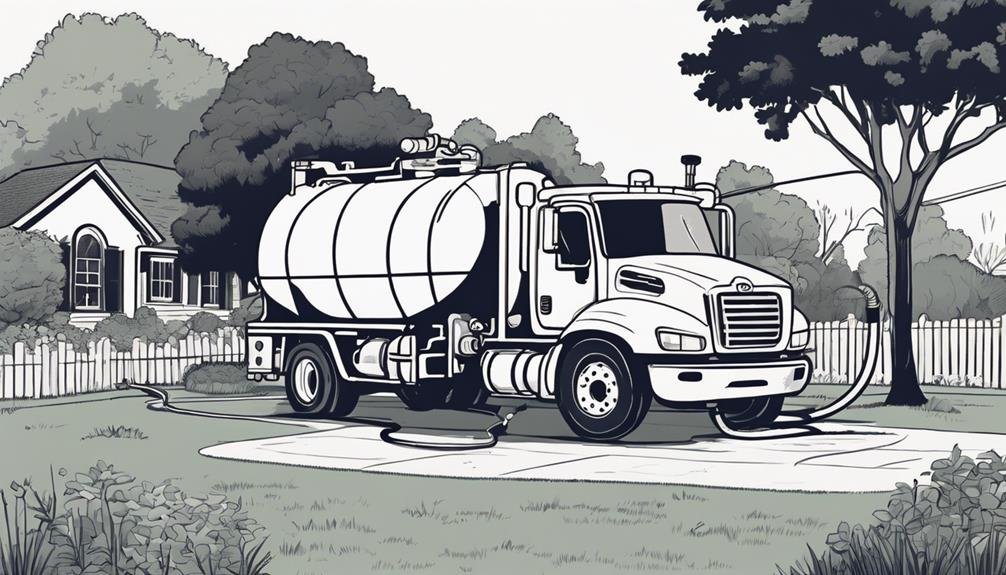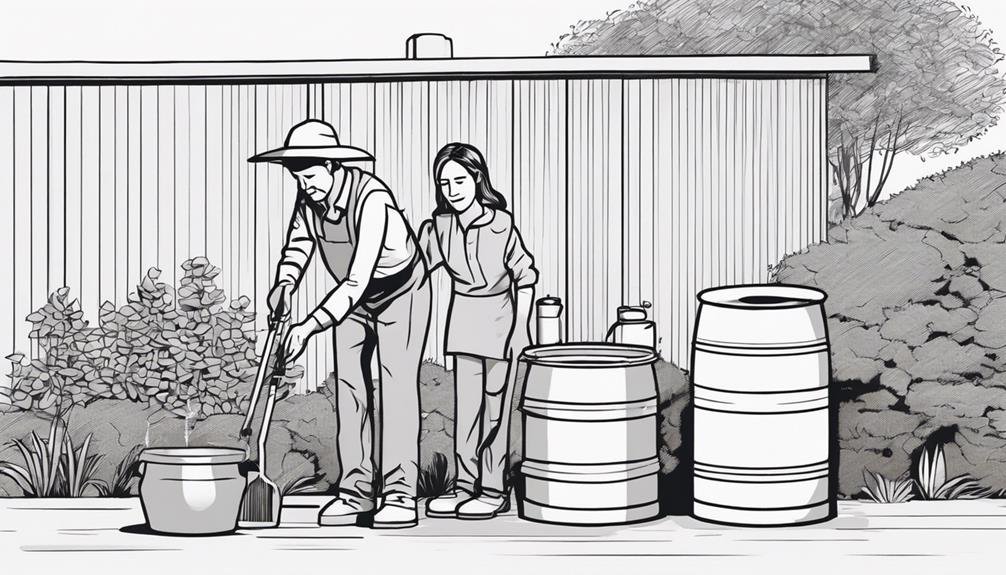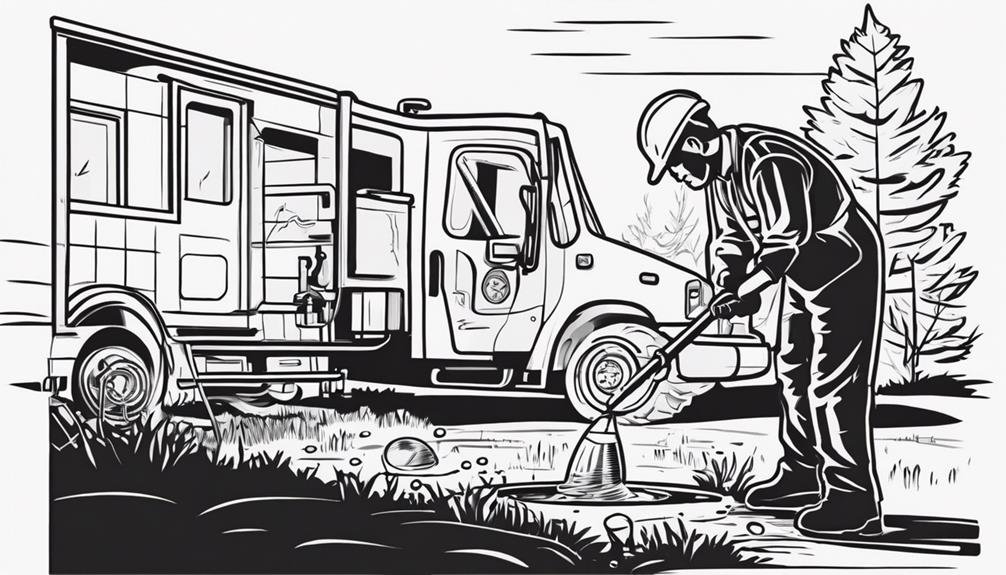If you think maintaining your septic tank is a hassle, think again. By following five essential tips, you can ensure its longevity and avoid costly repairs.
From regular pumping to proper waste disposal, each step plays a crucial role in maximizing your septic tank's lifespan. But there's one key aspect that often gets overlooked, and it could make all the difference in the world.
Stay tuned to uncover this vital tip that can save you both time and money in the long run.
Key Takeaways
- Regular pumping every 3-5 years prevents blockages and damage.
- Water conservation maintains bacterial balance and reduces clogs.
- Proper waste disposal practices ensure system longevity.
- Professional maintenance prevents costly repairs and enhances system health.
Importance of Regular Pumping

Regular pumping of your septic tank is essential to prevent buildup and maintain its optimal functionality. The pumping frequency depends on various factors such as the tank capacity and household size. As a general guideline, it's recommended to pump your septic tank every 3 to 5 years for an average household. However, if your household is larger or if you use a garbage disposal frequently, more frequent pumping may be necessary. Neglecting regular pumping can lead to solid waste accumulation in the tank, which can cause blockages in the system, leading to backups and potential damage.
Understanding your tank capacity is crucial in determining the pumping frequency. A larger tank will naturally require less frequent pumping compared to a smaller tank with limited storage capacity. By adhering to a regular pumping schedule based on your tank capacity and household needs, you can ensure the longevity and efficiency of your septic system, saving you from costly repairs and inconvenience in the long run.
Benefits of Proper Inspections
To maintain the health and longevity of your septic system, ensuring regular inspections is crucial for detecting potential issues early on. Proper inspections bring a plethora of benefits that contribute to the efficiency and prevention of problems within your septic system.
Here are four key advantages of conducting regular septic inspections:
- Early Detection: Inspections allow for the early detection of any issues such as leaks, blockages, or signs of wear and tear, preventing small problems from escalating into costly repairs.
- Optimal Performance: By identifying and addressing any issues promptly, your septic system can continue to function at its best, ensuring efficient waste treatment and disposal.
- Cost Savings: Detecting and fixing problems early can save you money in the long run by avoiding major repairs or even premature system replacement.
- Peace of Mind: Regular inspections provide peace of mind knowing that your septic system is well-maintained and operating smoothly, reducing the chances of unexpected failures.
Impact of Water Conservation

Conserving water significantly impacts the overall functionality and longevity of your septic system. By reducing the amount of water flowing into your septic tank, you can help maintain the balance of bacteria and enzymes necessary for effective waste breakdown. Conserving water not only eases the workload on your septic system but also minimizes the risk of issues like clogs, backups, and system failures.
When you practice water conservation, you aren't only benefiting your septic system but also positively impacting the environment. Reduced water usage means less strain on local water sources and wastewater treatment facilities. By using water wisely, you contribute to the preservation of natural resources and help prevent pollution.
Simple actions like fixing leaks, installing water-efficient fixtures, and being mindful of your water usage can make a significant difference in the health and lifespan of your septic system. Conserving water is a proactive step towards ensuring the optimal performance of your septic tank while promoting environmental sustainability.
Role of Proper Waste Disposal
Proper waste disposal plays a crucial role in maintaining the efficiency and functionality of your septic system. By adopting eco-friendly practices and implementing effective waste management strategies, you can ensure the longevity of your septic tank. Here are some essential tips to help you make the most of your waste disposal efforts:
- Limit Harmful Chemicals: Avoid pouring harsh chemicals like bleach, paint, or oils down the drain as they can disrupt the natural balance of bacteria in your septic tank.
- Dispose of Solid Waste Properly: Refrain from flushing non-biodegradable items such as wipes, feminine products, or paper towels, as they can clog the system and lead to costly repairs.
- Regular Pumping: Schedule routine septic tank pump-outs to prevent solid buildup and maintain the tank's efficiency.
- Compost Organic Waste: Consider composting kitchen scraps and organic materials instead of disposing of them through the garbage disposal, reducing the load on your septic system while benefiting the environment.
Significance of Professional Maintenance

Ensuring regular professional maintenance for your septic system is essential to uphold its optimal performance and longevity. Professional services provide a comprehensive inspection of your septic tank, including checking for leaks, blockages, or any signs of damage. These professionals have the expertise to identify potential issues early on, preventing costly repairs or replacements down the line.
Professional maintenance also involves crucial tasks such as pumping out solid waste and sludge, which can accumulate over time and cause clogs in your system. By entrusting these responsibilities to trained professionals, you ensure that your septic tank operates efficiently and effectively.
The benefits of professional maintenance extend beyond just preventing system failures. Regular servicing can improve the overall health of your septic system, leading to a longer lifespan and reduced risk of environmental contamination. Investing in professional services for your septic tank is a proactive approach that pays off in terms of both performance and longevity.
Frequently Asked Questions
Can Using Certain Household Cleaning Products Harm My Septic Tank Even if I Pump It Regularly?
Using certain household cleaning products can harm your septic tank even with regular pumping. The chemicals in these products can disrupt the balance of the septic system. Proper disposal and maintenance practices are crucial to minimize environmental impact.
How Does Landscaping and Tree Roots Affect the Lifespan of My Septic Tank?
Landscaping hazards can harm your septic tank's lifespan by tree roots infiltrating and causing damage. Implement root prevention strategies like planting trees far from the tank, installing root barriers, and regular root inspections to maintain your system's health.
Are There Any Warning Signs to Look Out for That Indicate My Septic Tank Is Experiencing Issues, Besides Regular Inspections?
Feeling like a bloodhound sniffing out trouble? Septic tank odors or slow draining fixtures are like red flags waving. Don't ignore these signs; they could be your septic system's way of screaming for help.
Are There Any DIY Maintenance Tasks I Can Perform to Help Extend the Lifespan of My Septic Tank?
To extend your septic tank's lifespan, DIY inspections are key. Regularly check for leaks, slow drains, and foul odors. Use effective treatments like bacterial additives to maintain a healthy balance. Proper care ensures longevity.
How Does the Size of My Household and Frequency of Water Usage Impact the Maintenance Needs of My Septic Tank?
To maintain septic health, consider water conservation. Household size impacts maintenance frequency. An average family of four uses 400 gallons daily. More water increases tank load. Adjusting usage habits can lessen strain, extending your tank's lifespan.
Conclusion
In conclusion, the key to maximizing your septic tank's lifespan lies in following these essential tips diligently. Remember, neglecting regular pumping, inspections, water conservation, waste disposal, and professional maintenance can lead to costly repairs and potential health hazards.
By taking proactive steps to care for your septic system, you can ensure its longevity and functionality for years to come. So, don't wait until it's too late – start implementing these tips today to keep your septic tank running smoothly.

